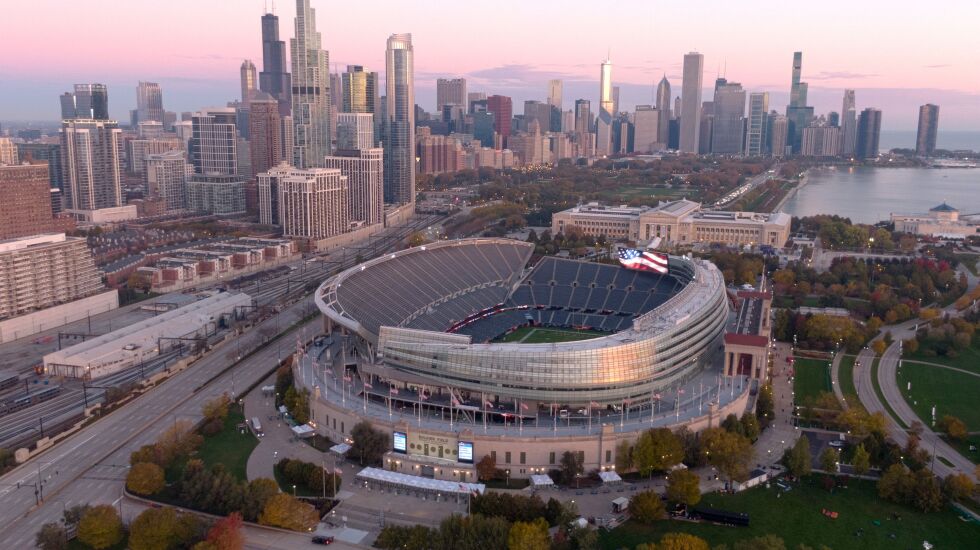
I was wondering when it would get to this. Because it always does.
You know, the shoulder-shrugging, second-guessing, third-guessing, maybe-I’ll-take-my-ball-and-go-home posturing by the powerful rich kid who’s asking the neighborhood for a ‘‘favor.’’
In this case, the rich kid is the Bears.
And the favor Illinois’ only NFL team is asking for is, well, all kinds of stuff for its proposed new stadium in Arlington Heights. Or somewhere.
The Bears bought the 326-acre site of the former Arlington International Racecourse for $197 million in February. Architectural renderings of their desired master plan for a new domed stadium and ‘‘mixed-use district’’ make it look a bit like a blend of Disneyland and a Georges Seurat pointillism canvas.
That is, happy folks strolling about, boaters languidly punting on the new lagoon, contraptions and buildings all around, leading to the main ride itself: the huge, domed stadium where the Bears would play 10 to 15 times a year.
What’s happening now is the Bears are balking at things such as property taxes, shared infrastructure, neighborhood demands and other limitations any prudent town or city would put on a potential new resident.
Actually, Arlington Heights Mayor Tom Hayes recently said on WGN-AM that the Bears’ issue isn’t with the suburb’s administration itself but with the three local school districts.
No matter. School districts can be as hard to appease as city halls — as they should be. People and children actually live in these neighborhoods.
Abruptly, like a fox sensing a wounded chicken, enter Naperville as a feeder.
Naperville Mayor Scott Wehrli wrote in a letter to the Bears last week: ‘‘We have several available or to-be-available sites that may fit the characteristics you are looking for in your future home.’’
Wehrli then drooled a bit, adding: ‘‘Being the home of the Chicago Bears would unlock tremendous economic benefits for our community.’’
Everybody here, you see, is looking out for themselves. It’s called capitalism. The only hitch is that the Bears exist in a world that is only quasi-capitalistic; it’s mostly imperialistic. Indeed, the Bears thrive in a cartel called the National Football League.
There are 32 members of this cartel, and nobody else can get in. There hasn’t been a team added to the NFL in 21 years, yet our population has grown by 45 million during that time.
This is an astounding breach of what we like to think of as American fair play. But so it is.
Consider this: Green Bay, Wisconsin, the 139th-biggest city in the United States, has one team, and Chicago, the third-biggest, has one. Chicago’s metro area (8.9 million) is roughly 27 times larger than Green Bay’s (330,000). But we’ve got one team, and we’ll never get another if the McCaskeys have their way.
So who has leverage in these land deals? If you said the NFL team involved, well done.
Chicago lost out on the future of the Bears the day then-Mayor Richard M. Daley agreed to drop a gigantic toilet-bowl seat on dumpy, old Soldier Field and call it a renovation. Recently deposed Mayor Lori Lightfoot didn’t help when she said — with typical snarkiness — two years ago that the Bears shouldn’t worry about a new stadium but should try ‘‘putting a winning team on the field’’ and ‘‘being relevant past October.’’
Of course, that’s true — if you weren’t dealing with a cartel member. Lightfoot’s belated efforts to get a dome stuck on Soldier Field were way too little way too late. Doming that place, anyway, would be like putting a roof over a tool shed.
Hayes said he was OK with the Bears sniffing around in other places ‘‘to complete their due diligence.’’ But he also said that the Bears have been looking at the Arlington Heights site for 50 years and that it’s ‘‘a dream come true for them.’’ And they know it.
But how good is a stadium for any town or region that wants one? Not very. History has proved this. All those created jobs and ‘‘opportunities’’ are mostly hooey.
I could explain in depth, but take this from a 2018 research article in The Atlantic with the headline ‘‘Sports Stadiums Are a Bad Deal for Cities’’:
‘‘Imagine a stadium as a giant drain. Money flows from the community into the stadium, where it whirls around for a bit, then funnels down some murky pipes, exiting far, far away.’’
Let the wooing, spurning and whining spark onward.
And best wishes to whoever ‘‘wins’’ the Bears.







